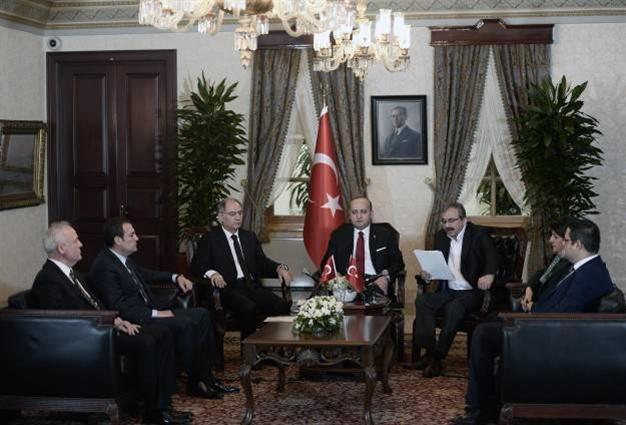ANALYSIS: Turkish government starts negotiations with PKK for Kurdish peace
Murat Yetkin

HDP deputy Sırrı Süreyya Önder reads the historic Kurdish issue statement at a joint media conference with government representatives. AA Photo.
In a joint press conference on Feb. 28 with the Kurdish problem-focused Peoples’ Democratic Party (HDP), the Turkish government said it was ready for a direct negotiation process with the outlawed Kurdistan Workers’ Party (PKK) - aimed at ending the PKK’s 30-year armed campaign - for a political solution to the country’s Kurdish problem.Sırrı Süreyya Önder, an MP for the HDP as the mediating party between the government and the PKK, said the imprisoned leader of the PKK had called its organization to convene an extraordinary congress to declare a reinforced cease-fire with the Turkish government with the purpose of abandoning arms if a 10-article framework penned by Öcalan formed the basis of the negotiations.
The articles include recognition of Kurdish identity and reinforcement of the authorities and autonomies of local administrations with constitutional guarantees in a new constitution, but they exclude the formation of a Kurdish state, which the PKK was originally established to fight for, leading to a conflict in which 40,000 people were killed.
This could turn into a breakthrough in Turkey’s chronic Kurdish problem, depending on the subsequent steps to be taken. It could be a historical step for the internal peace of Turkey, with effects on political balances across the Middle East.
The government has been talking to Öcalan since late 2012 with the initiative of (then prime minister) President Tayyip Erdoğan through the then National Intelligence Agency (MİT) Chief Hakan Fidan. The HDP then came onto the scene as the mediating party between the government, Öcalan and the PKK headquarters in the Kandil Mountains of northern Iraq.
Such a joint press event has been considered for some time, to signal a level up from “dialogue” to “negotiations” between the Turkish government and the PKK.
Selahattin Demirtaş, the co-chairman of the HDP, said after the press conference that the government should withdraw a controversial Homeland Security Package from parliament in order to show its sincerity about the peace process.
The fact that some of the 10 articles directly refer to a new Turkish constitution links the fate of the peace process to the parliamentary elections on June 7, with continued question marks about possible cooperation between the HDP and the ruling Justice and Development Party (AK Parti) in the election.
It may be too early to predict that the process will come to a happy end, reinforcing unity, peace and democracy in Turkey, but it is true that it has never before come so close.
















